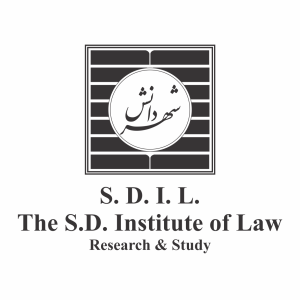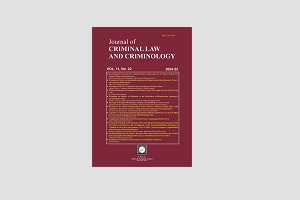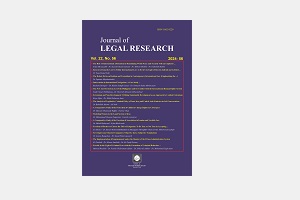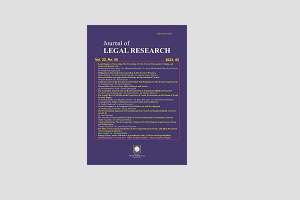Journal of
Criminal Law and Criminology
Number 17
Vol. IX ● No. 1
spring – summer 2021
Managing Editor: Vahid Eshtiagh
Editor-in-Chief: Mohammad Ashoori
CONTENTS
State Duty to Protect Human Rights: The Necessity of Acceptance of Corporate Criminal Responsibility for Human Rights Violations in National Legal Systems
Dr. Seyed Ghasem Zamani & Dr. Nasim Rahmannasab Amiri
Origin and Legitimacy of Exercising the Principle of Universal Jurisdiction in National Courts to Prosecute International Crimes
Hojjatollah Rezaei & Dr. Mohammad Ali Mahdavi sabet
The Effectiveness of Lifestyle on Homelessness Victims
Seyyede Sekine Musavi & Dr. Shahla Moazami
The Role of Anti-Corruption Non-Governmental Organizations in Corruption Prevention in Iran
Nahid Naseri & Sadeg Salimi & Dr. Hooshang Shambayati
Comparative Dimensions of Prohibition of Inference from the Accused’s Silence in Iran and USA Criminal Law and its Courts Jurisprudence
Dr. Javad Salehi
A Criminological Approach to the Challenges of the Neoliberal Political-Economic System with a Look at the Coronavirus Conditions
Dr. Hossein Gholami & Elahe Sadat Kasaee
Sociological Study of the Developments of Punishment in Public in Post-Revolutionary Iran
Dr. Mohsen Nourpour & Dr. Seyyed Mohammad Javad Sadati
The Transformation of Provision Security to Private Sector at Iranian and British Criminal Law, Concept, Legal Foundation and Manifestations
Sahar Soheilmoghadam & Dr. Nasrin Mehra
The Effect of The Covid-19 Disease and Social Distance on Crime Rates (Case Study: Tehran Province)
Dr. Ali Saffary & Dr. Razieh Saberi & Dr. Zeynab Laki & Abbas Rezaei
ABSTRACTS
State Duty to Protect Human Rights: The Necessity of Acceptance of Corporate Criminal Responsibility for Human Rights Violations in National Legal Systems
Dr. Seyed Ghasem zamani
Professor, Department of Public and International Law, Faculty of law and Political Science, Allameh Tabataba’i University, Tehran, Iran
Email: zamani@atu.ac.ir
&
Dr. Nasim Rahmannasab Amiri
Ph.D. in Public International Law, Faculty of law and Political Science, Allameh Tabataba’i University, Tehran, Iran, Corresponding Author
Email: nasim.amiry@gmail.com
Abstract:
Ascending role and potential of corporations and financial institutions, specifically transnational corporations in today world in one side, and their influence on affairs which were previously were considered as the sole competence of states in the other, have provoked serious human rights concerns about corporate human rights’ violations. In order to respond to said concerns, the sate duty to protect human rights against third parties’ interference (including corporations) has been recognized by international human rights law. Therefore, by employing all appropriate measure particularly legal initiatives, states have duty to battle human rights violations. Unfortunately, review of different national legal systems reveals that criminal law, as one of the most important parts of national legal system has not been properly utilized in order to fulfill the state duty to protect human rights. The present article endeavor to prove that acceptance of corporate criminal liability, criminalization of corporate violations of, at least, the most fundamental human rights and also take advantage of criminal law measures are inevitable for convenient fulfillment of state duty to protect of human right.
Keywords: Corporate, Human Rights, Duty to Protect, Criminal Law.
Origin and Legitimacy of Exercising the Principle of Universal Jurisdiction in National Courts to Prosecute International Crimes
Hojjatollah Rezaei
PhD in Criminal Law and Criminology, Department of Criminal Law and Criminolgy, Faculaty of Law, Thology and Political Science, Science and Research Branch, Islamic Azad University, Tehran, Iran
Email: rezaeilawyer31@gmail.com
&
Dr. Mohammad Mahdavi sabet
Assistant Professor, Department of Criminal Law and Criminology, Faculty of Law , Theology and Political Science, Science and Research Branch, Islamic Azad University, Tehran, Iran, Corresponding Author
Email: m-mahdavisabet@srbiau.ac.ir
Abstract:
Universal Jurisdiction is a Powerful Tool at Service of International Justice. This Principle, which under this,States have the Option – and Sometimes the Obligation – to Prosecute Criminals, Regardless of Where the Crimes may have been Committed or of the Nationality of Perpetrators and the Victims, has evolved in Various Aspects. although the the Concept of Universal Jurisdiction Arose because of the Protect of International Trade, ths has now become anInevitable Necessity to Support Human Values. although legal Systems View of this Jurisdiction is different, but for Reasons Like, the Necessity for Protecting Common Interests, Protecting Human Values and the Victims Access to Justice Which has been expressed in the Justification of its Justification have brought it Closer to Universal Accepance. Thus, in this Paper, it has been Tried to Investigate the Source and Legitimacy for the application of the Principle of Universal Jurisdiction in the National Courts to Prosecution of International Crimes.
Keywords: Legitimacy, Universal Jurisdiction, National Courts, International crimes.
The Effectiveness of Lifestyle on Homelessness Victims
Seyyede Sekine Musavi
PhD Student in Criminal Law and Criminology, Faculty of Law, North Tehran Azad University, Tehran, Iran, Corresponding Author
Email: musaviakram@yahoo.com
&
Shahla Moazami
Associate Professor, Department of Criminal Law and Criminology, Faculty of Law and Political Science, University of Tehran, Tehran, Iran
Email: amoazami@gmail.com
Abstract:
Homelessness is a social deviation specific to urban societies The unfortunate consequences of this social disaster have made it a social issue. It comes from the experience of victims and the community, and it is predictable that vulnerable people will be exposed to the possibility of repeated victimization, the tendency to risk behaviors and abuse.The present study is a descriptive and qualitative study using semi-structured interviewing tool on statistical population of 100 homeless women. The present study shows that the experience of victimization and, in a broader sense, victimization plays a colorful role in guiding women towards the experience of homelessness.Its purpose is to contribute scientifically to the process of designing, formulating, and reviewing criminal and social policies in order to prevent effective victimization of homelessness The present study shows that homeless women experience this phenomenon differently from men because of the experience of gender-based victims, the lifestyle imposed on them, daily activities, access to illegal opportunities, presence in hot areas. The city makes them vulnerable victims The risk of repeated and secondary victimization is predictable in these women.
Keywords: Homelessness, Victimization, Lifestyle, Women.
The Role of Anti-Corruption Non-Governmental Organizations in Corruption Prevention in Iran
Nahid Naseri
PhD student in Penal law and criminology, Faculty of Law, Islamic Azad University, Central Tehran Branch, Tehran, Iran
Email: nahidnaseri123@gmail.com
&
Sadeg Salimi
Associate Professor, Department of Penal law and criminology, Faculty of Law, Islamic Azad University, Central Tehran Branch, Tehran, Iran, Corresponding Author
Email: sadegsalimi@yahoo.com
&
Dr. Hooshang Shambayati
Assistant Professor, Department of Penal law and criminology, Faculty of Law, Faculty of Law, Islamic Azad University, Central Tehran Branch, Tehran, Iran
Email: hoo.shambayati@iauctb.ac.ir
Abstract:
In recent years, reports on amount of corruption and administrative health in media and public discourse have increased. Corruption has widespread even in non-governmental organizations. Iran’s Corruption Perceptions Index on January 2020 is 146 out of 180 countries and Regulatory quality index is 178 out of 193 countries. The present article deals with pathology of situation of anti- corruption non-governmental organizations and evaluate the role of state actors in anti-corruption NGOs (state-oriented NGOs) and its prevention in Iran.
This survey is a qualitative one and in terms of implementation, is a descriptive-analytical method which have been obtained by using Political Delphi technique, documentary and library tools from national and international reputable databases. The statistical population is the total number of anti-corruption NGOs reported in official information sources, (9) cases.
Findings showed the vast majority of founders of Anti-Corruption Non-Governmental Organizations in Iran are authorities. Non-standard Acts and regulations, depriving some of police duties and delivering it to other agencies or persons and lack of giving licenses to non-officials are some of observed problems in Iran.
Ways and conditions of establishing and granting license to anti-corruption non-governmental organizations, which is issued only to specific individuals and groups, have reduced effectiveness of anti-corruption activities. Non-state-oriented anti-corruption NGOs can combat corruption by proactive, reactive and preventative measures.
Keywords: Iran, Corruption, Prevention, Non-Governmental Organizations, State-oriented.
Comparative Dimensions of Prohibition of Inference from the Accused’s Silence in Iran and USA Criminal Law and its Courts Jurisprudence
Dr. Javad Salehi
Associate Professor, Department of Law, Faculty of Social Sciences, Payame Noor University, Tehran, Iran
Email: Javadsalehi@pnu.ac.ir
Abstract:
Accused’s silence in criminal law is not evidence and proof of crime or inference. However, accused’s silence and inference of crime in USA criminal courts’ jurisprudence create conditions that ultimately end to accused detriment. This situation is contrary to requirements of criminal law and Iran criminal courts’ jurisprudence. In this respect, examining dimensions of permissible or prohibitive view of inference from accused’s silence in criminal law and jurisprudence are important to reply research question. What are status of inference from accused’s silence in Iran and USA criminal law and its jurisprudence? Investigation findings show that accused’s silence was identified in Iran criminal law during the judicial official interrogation phase, while it is for protecting accused against police interrogation. This situation is contrary to USA criminal law, which has identified the accused’s silence during police interrogation. Second, accused’s silence in Iran criminal law and its jurisprudence is a manifestation of accused’s defense rights and is not inference of commission of crime. This situation is similar to USA criminal law, but USA jurisprudence does not follow consequences of accused’s silence when he/she is not in police custody. However, accused’s silence application prevents separation two stages of accused detention and before that in order to enjoy or be deprived of right of silence’s privileges. In this respect, inference of crime from accused’s silence before his/her custody in USA criminal courts’ jurisprudence is contrary to fair criminal trial’s standards.
Keywords: Inference of Commission of Crime, Accused’s Silence, Criminal Fair Trial, Iran Criminal Law, USA Jurisprudence.
A Criminological Approach to the Challenges of the Neoliberal Political-Economic System with a Look at the Coronavirus Conditions
Dr. Hossein Gholami
Professor, Department of Criminal Law and Criminology, Faculty of Law and Political Science, Allameh Tabataba’i University, Tehran, Iran, Corresponding Author
Email: gholami@atu.ac.ir
&
Elahe Sadat Kasaee
Ph.D. Student in Criminal Law and Criminology, Faculty of Law and Political Science, Allameh Tabataba’i University, Tehran, Iran
Email: elahekasaee@yahoo.com
Abstract:
The widespread disease of COVID-19 is rapidly changing social relations and economic prospects around the world. This disease has exposed the toxic effects of the neoliberal system, which has dominated all aspects of our societies.
Now is the time to ask what kind of political-economic system can prevent the recurrence of harmful results? Certainly, the right policy in these critical situations can reduce the scope of the pervasive harms of this disease to some extent, including poverty, unemployment and, consequently, crimes in the near and distant future.Studies show that the neoliberal system influences a variety of crimes in a variety of ways, including the economic pressures of poverty and unemployment on different sections of society. However, welfare models are more effective in preventing the crime of citizens by providing and ensuring the security of citizens’ lives. As the prevalence of the COVID-19 virus increases social harm, governments need to change their economic policy toward welfare to adopt a supportive approach to controlling social consequences.
Keywords: Neoliberalism, the model of welfare, criminology, delinquency, criminology.
Sociological study of the developments of punishment in public in post-revolutionary Iran
Dr. Mohsen Nourpour
Ph.D. in Law and Criminology, Faculty of Law and political science, Ferdowsi University of Mashhad, Mashhad, Iran
Email: nourpour.mohsen@yahoo.com
&
Dr. Seyyed Mohammad Javad Sadati
Assistant Professor, Department of Law and Criminology, Faculty of Law and political science, Ferdowsi University of Mashhad, Mashhad, Iran, Corresponding Author
Email: mj.sadati@um.ac.ir
Abstract:
From the Islamic revolution penal reactions in Iran has been experienced two completely different periods: first the revival of public display of suffering in the first decade of the revolution and then, elimination of this kind of punishment from public arena in the next decades. Undoubtedly, political economy of power has important role in this penal changes. However, we cannot neglect the role of structure of social solidarity.
Birth of single-structured society in the first decade of Islamic revolution paved the way for revival of public punishments. In this time, public display of suffering were like rituals that its role were revival of social values in single-structure society. But, in the following decades, these punishment were not understood by society. Because of it, physical punishments step by step eliminated from public arena and transferred in the bureaucratic system.
Keywords: Ritual society, ritual punishment, single-structured society, multi-structured society, technical punishment.
The transformation of Provision Security to Private Sector at Iranian and British Criminal Law, Concept, Legal Foundation and Manifestations
Sahar Soheilmoghadam
Ph.D. Student in Criminal Law and Criminology, Faculty of Law, Shahid Beheshti University, Tehran, Iran, Corresponding Author
Email: S_Soheilmoghadam@sbu.ac.ir
&
Dr. Nasrin Mehra
Associate Professor, Department of Criminal Law and Criminology, Faculty of Law, Shahid Beheshti University, Tehran, Iran
Email: N_mehra@sbu.ac.ir
Abstract:
In the past, the provision of security was the duty of state and public authorities specially police, but in the twentieth century, we are witnessing the transition from public to private security and the emergence of new and non-governmental actors, which has been accompanied by a kind of security commodification. The emergence of mass private property, the growth technical surveillance systems, rising crime rates and insecurity, as well as the oversupply of public demand from the resources available to the state police, have welcomed private security companies, and government have realized that they can no longer be the sole security agents. In this article, with comparative analytical approach, we discuss the concept, legal foundation and manifestations of the private security industry in Iranian and British law. Findings indicate that the key elements of the private security industry in Iranian law are narrower than in British law and cases such as private detectives, the use of private experts in the investigation of crimes such as fraud are not recognized, in fact the physical security of the industry is more welcomed. In the field of prison services, detection and cyber security, government security and the exception of private security are dominated.
Keywords: private security industry, Iranian criminal law, British law, loss prevention.
The effect of The Covid-19 Disease and Social Distance on Crime Rates (Case study: Tehran province)
Dr. Ali Saffary
Associate professor, Department of Criminal law & Criminology, Faculty of Law, Shahid Beheshti University, Tehran, Iran
Email: a-saffary@sbu.ac.ir
&
Dr. Razieh Saberi
Assistant professor of Criminal law & Criminology, Shahr Danesh Law Institute, Tehran, Iran
Email: saberi@sdil.ac.ir
&
Dr. Zeynab Laki
Ph.D. in Criminal law and Criminology, Faculty of Law, Shahid Beheshti University, Tehran, Iran
Email: lakizeynab@gmail.com
&
Abbas Rezaei
Ph.D. Student in Criminal law and criminology, Faculty of Humanities, Azad University (Central Tehran) and Prosecutor, Firoozkooh city, Tehran province, Tehran, Iran.
Email: paeizan4@gmail.com
Abstract:
The prevalence of Covid-19 infectious disease and social distance have had a profound effect on the rates of various crimes. In this article, we try to influence the current situation on the rates of some crimes such as Theft, Intentional serious bodily injury, Drug addiction, Organized fraud, Disruption of public order and comfort, Child abuse, Participation in mass conflict, Snatching and pick pocketing in Tehran province and several important cities of this province, namely Tehran, Damavand, Shahr-e Rey, Shahriyar, Pakdasht, Islamshahr, Varamin and Mallard should be studied.
Initially, the data related to the crimes studied in this study, which were reported to the police in Tehran province in the days after the spread of the disease and the beginning of measures related to social distancing and in the period from March 2019 to the end of October 2020, were collected through official institutions. Then, the available data related to the mentioned crimes with the same period in the previous year, i.e., the beginning of July 2019 to the end of February 2019 were collected in the same province. In order to better understand how the current situation affects the crime rate, the data related to several important cities of this province were separated from each other and then both periods were compared in terms of changes in the number of crimes studied in the cities in this study. Descriptive statistics method was used to analyze the data. To compare the situation of cities and Tehran province in terms of crime before and after the corona, the index of relative growth of crime in the post-corona period compared to before the corona has been calculated.
The prevalence of Covid-19 disease and the social order of social distancing have had different effects on different crimes. During the outbreak of this disease, all the crimes studied in the present study in Tehran province decreased and only the crime of drug addiction increased. The change in crime rates, both in Tehran province and in different cities of this province, varies depending on the type of crime.
Findings confirm that social constraints have changed the patterns of daily activities and the opportunity structures created as a result of these changes have changed the crime rate. These findings underscore the need for public awareness of the increased risk of domestic violence, especially child abuse during outbreaks, the need to strengthen education on how to respond more effectively and safely to social emergency requests, and the encouragement of domestic violence reporting, provide facilities for faster reporting of domestic violence and child abuse, launch online social assistance services, build happy television programs, and increase alternative forms of empowering community observers.
Keywords: Covid-19, distancing social, Crimes Rate, Theory of Routine Activity.





